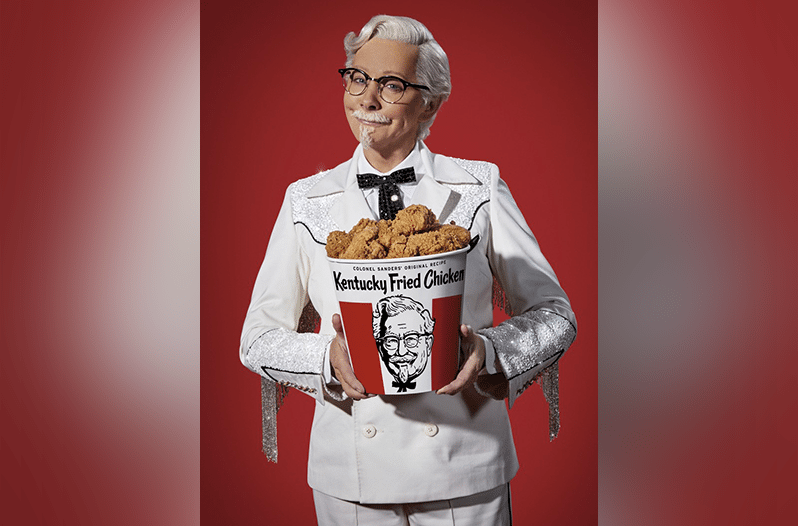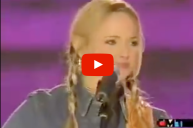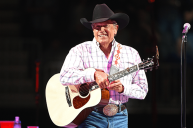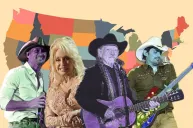[dropcap]B[/dropcap]efore Reba donned that Colonel Sanders suit and 'stache and even before George Strait had his own line of Wrangler jeans, country artists have been pairing up with brands.
Videos by Wide Open Country
Tom T. Hall sold everything from Chevy El Caminos to Tyson chicken. Mel Tillis famously appeared in a string of Whataburger commercials. Loretta Lynn taught us that "Crisco makes a pie crust real flakey." And Hank Williams hawked Mother's Best Flour on WSM every morning, even going so far as to write a jingle for the product.
I love to have that gal around
Her biscuits are so nice and brown
Her pies and cakes beat all the rest
'Cause she makes them all with Mother's Best
The list goes on and on. And it makes perfect since. After all, it was a company (and one great brand pairing) that helped put country music on the map. The Nashville-based National Life and Insurance Company owned WSM AM, the station that broadcasts the Grand Ole Opry, for much of the station's history. (The call letters 'WSM" came from the company's motto, "We Shield Millions.")
But the past decade has seen artist-brand pairings that go beyond the usual "down-home" brands of baking goods, Chevys and chicken. Brad Paisley has been the face of the insurance company Nationwide. Carrie Underwood was named brand ambassador for cosmetics giant Almay. In 2011, Keith Urban signed a sponsorship deal with AT&T and Samsung. Multi-national pharmaceutical and life sciences corporation Bayer has sponsored Luke Bryan's Farm Tour for three years straight. There's been a shift from country lifestyle partnerships to brands actively seeking out country artists to represent their product.
So why do brands love country music so much right now?
Beyond Beer and Trucks
Beer has been the subject (and inspiration) of many country songs and the appreciation appears to be mutual. At a country music showcase at this year's SXSW festival in Austin, Budweiser was the sole sponsor. And it's far from the first time the brand put its name front and center at a country music event. Obviously, that's a very sensible and calculated move.
Ricardo Marques, the vice president of marketing for Budweiser, told AdWeek that partnering with country music events is a guaranteed win.
"It makes sense for our brand, where we come from and where we want to take it, Marques told AdWeek. "It's the fastest growing music genre in the U.S. today, resonating with people 21 and up, in different parts of the country."
The "fastest growing genre" part is where the world's biggest brands, from tech companies to pharmaceutical giants, enter.
According to research by the CMA, there's been a 57 percent increase in country music consumers between 18 and 24 years old in the last decade. Over 115 million people over the age of 18 consider themselves country music fans. The average annual household income of country fans is $78.9 thousand
In other words, brands look at country fans and see dollar signs.
Country's Growing Marketability
Country music's growing marketability is due in part to its ever expanding sound. The blending of genres, the rise of streaming services and recent crossover smashes like Sam Hunt's "Body Like a Backroad" and Florida Georgia Line and Bebe Rexha's "Meant to Be" have taken country music even further into the stratosphere -- even if it means alienating fans of a more traditional sound.
Then there's mainstream country's approachable image.
Robert Weiner, pop culture librarian at Texas Tech University, told AdAge that country's down-to-earth reputation is one of its greatest assets when it comes to attracting brand partnerships.
"Country artists have an image as someone you could walk up to at the 7-Eleven or, if they're eating at Denny's, and you could say hello to," Weiner said.
Country fans who were alive in the mid-90s probably remember George Strait doing ads for Tractor Supply Company. It's easy to imagine the King of Country, who grew up on a Texas ranch, shopping at Tractor Supply. It was part of his own brand.
But branding in country music has changed. Instead of artists branding themselves, brands are now doing demographic research on an artist to determine if they're a good fit to sell to their consumers.
Read More: These Commercials Featuring Country Stars Will Give You a Serious Case of Nostalgia
The country music industry had made a serious effort to attract brands outside of the usual suspects. Late last year, the Country Music Association held a boot camp for advertisers to set the record straight on the average country music consumer. Namely, country listeners are younger, wealthier and more brand-friendly than advertisers may have thought.
On the CMA website, there's a rundown of the current country music consumer stressing the "buying power" of the average country fan.
What does this all mean for country music? Will an artist's marketability be the driving factor in success in the industry? Is country in danger of being watered down for greater mass appeal?
With the ongoing "authenticity" debate in country music, it's worth considering what the branding of country music means for the genre itself.




